Clinical Supervision: Mentoring, Debriefing, Support, and Differences
VerifiedAdded on 2023/02/01
|15
|3945
|61
Essay
AI Summary
This essay critically examines clinical supervision, mentoring, and debriefing as clinical support mechanisms for nurses and midwives. The introduction highlights the pressures faced by healthcare professionals, leading to burnout and the need for support systems like mentoring and debriefing. The discussion section differentiates mentoring, where experienced nurses guide novices, from clinical supervision, which addresses stress and burnout, and debriefing, which is a team-based reflective practice. Mentoring focuses on boosting self-esteem and confidence, clinical supervision provides support for commitment fatigue, and debriefing promotes collaborative practice and interpersonal skills. The essay outlines the strengths and weaknesses of each approach, including the benefits of clinical supervision such as improved practice and wellbeing, and the challenges like time constraints and potential ethical issues. The paper emphasizes the distinct aims, outcomes, and target groups of each support method, ultimately contributing to a comprehensive understanding of these crucial elements in healthcare practice and professional development.

Running head: CLINICAL SUPERVISION
Clinical supervision
Name of the Student
Name of the University
Author Note
Clinical supervision
Name of the Student
Name of the University
Author Note
Paraphrase This Document
Need a fresh take? Get an instant paraphrase of this document with our AI Paraphraser
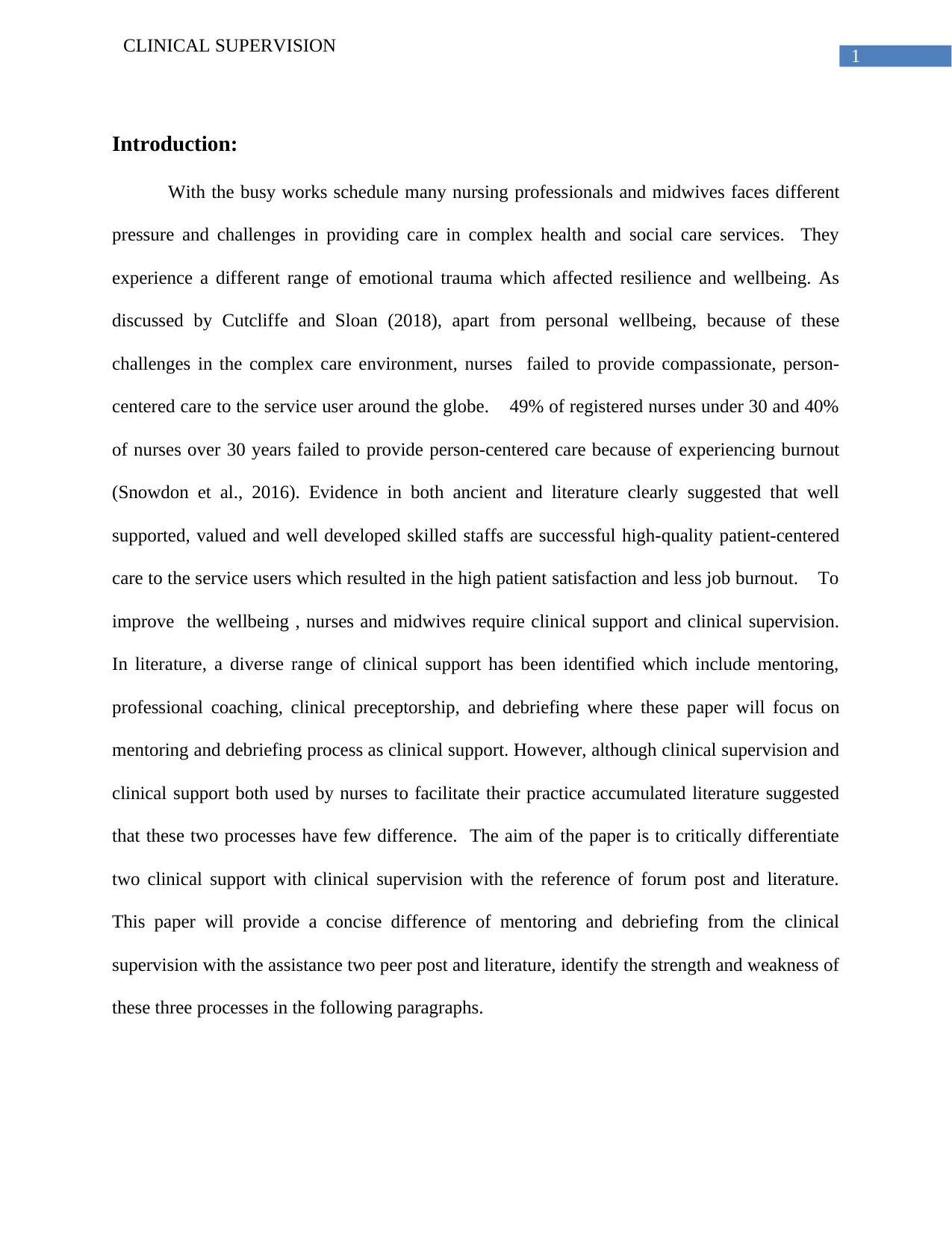
1
CLINICAL SUPERVISION
Introduction:
With the busy works schedule many nursing professionals and midwives faces different
pressure and challenges in providing care in complex health and social care services. They
experience a different range of emotional trauma which affected resilience and wellbeing. As
discussed by Cutcliffe and Sloan (2018), apart from personal wellbeing, because of these
challenges in the complex care environment, nurses failed to provide compassionate, person-
centered care to the service user around the globe. 49% of registered nurses under 30 and 40%
of nurses over 30 years failed to provide person-centered care because of experiencing burnout
(Snowdon et al., 2016). Evidence in both ancient and literature clearly suggested that well
supported, valued and well developed skilled staffs are successful high-quality patient-centered
care to the service users which resulted in the high patient satisfaction and less job burnout. To
improve the wellbeing , nurses and midwives require clinical support and clinical supervision.
In literature, a diverse range of clinical support has been identified which include mentoring,
professional coaching, clinical preceptorship, and debriefing where these paper will focus on
mentoring and debriefing process as clinical support. However, although clinical supervision and
clinical support both used by nurses to facilitate their practice accumulated literature suggested
that these two processes have few difference. The aim of the paper is to critically differentiate
two clinical support with clinical supervision with the reference of forum post and literature.
This paper will provide a concise difference of mentoring and debriefing from the clinical
supervision with the assistance two peer post and literature, identify the strength and weakness of
these three processes in the following paragraphs.
CLINICAL SUPERVISION
Introduction:
With the busy works schedule many nursing professionals and midwives faces different
pressure and challenges in providing care in complex health and social care services. They
experience a different range of emotional trauma which affected resilience and wellbeing. As
discussed by Cutcliffe and Sloan (2018), apart from personal wellbeing, because of these
challenges in the complex care environment, nurses failed to provide compassionate, person-
centered care to the service user around the globe. 49% of registered nurses under 30 and 40%
of nurses over 30 years failed to provide person-centered care because of experiencing burnout
(Snowdon et al., 2016). Evidence in both ancient and literature clearly suggested that well
supported, valued and well developed skilled staffs are successful high-quality patient-centered
care to the service users which resulted in the high patient satisfaction and less job burnout. To
improve the wellbeing , nurses and midwives require clinical support and clinical supervision.
In literature, a diverse range of clinical support has been identified which include mentoring,
professional coaching, clinical preceptorship, and debriefing where these paper will focus on
mentoring and debriefing process as clinical support. However, although clinical supervision and
clinical support both used by nurses to facilitate their practice accumulated literature suggested
that these two processes have few difference. The aim of the paper is to critically differentiate
two clinical support with clinical supervision with the reference of forum post and literature.
This paper will provide a concise difference of mentoring and debriefing from the clinical
supervision with the assistance two peer post and literature, identify the strength and weakness of
these three processes in the following paragraphs.
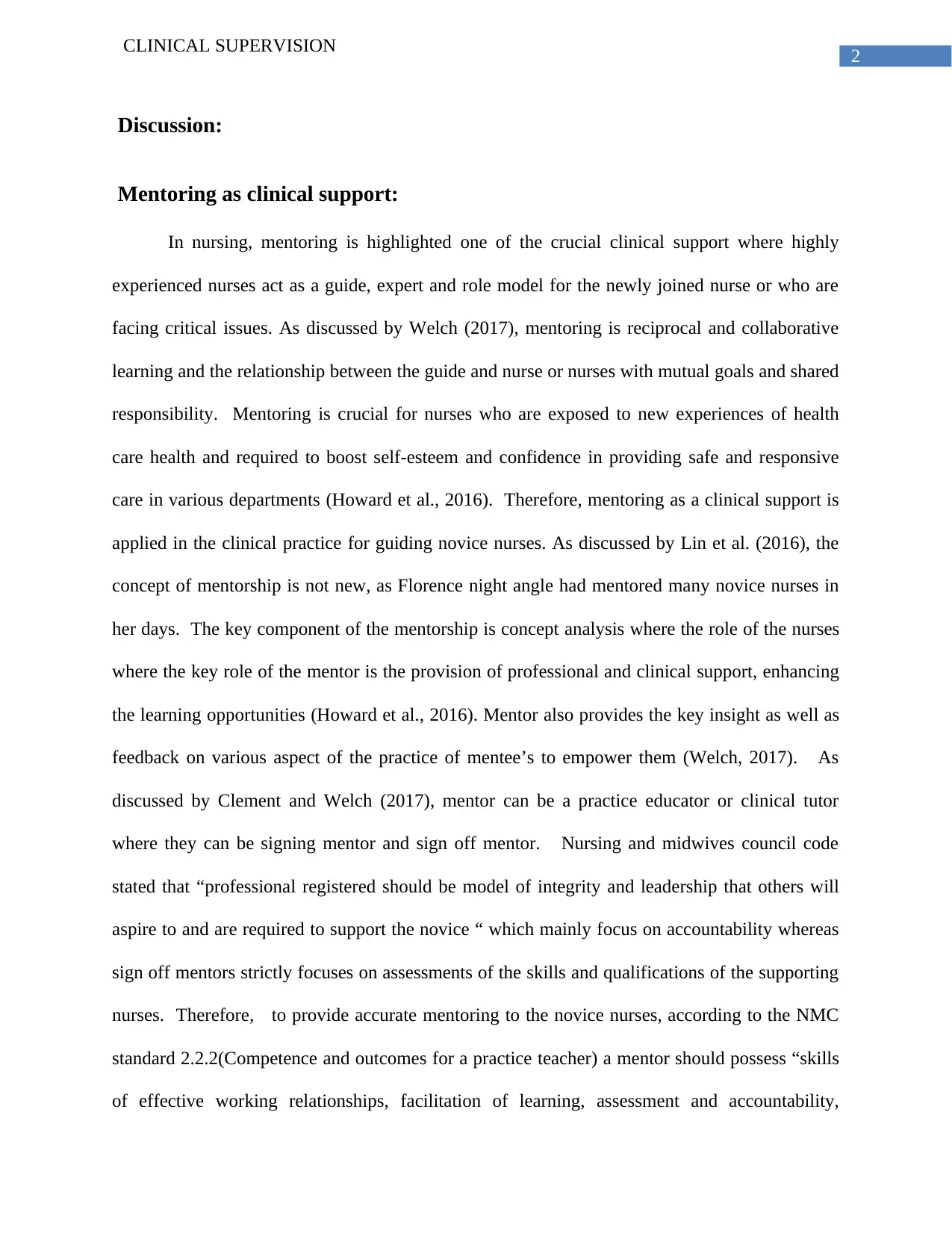
2
CLINICAL SUPERVISION
Discussion:
Mentoring as clinical support:
In nursing, mentoring is highlighted one of the crucial clinical support where highly
experienced nurses act as a guide, expert and role model for the newly joined nurse or who are
facing critical issues. As discussed by Welch (2017), mentoring is reciprocal and collaborative
learning and the relationship between the guide and nurse or nurses with mutual goals and shared
responsibility. Mentoring is crucial for nurses who are exposed to new experiences of health
care health and required to boost self-esteem and confidence in providing safe and responsive
care in various departments (Howard et al., 2016). Therefore, mentoring as a clinical support is
applied in the clinical practice for guiding novice nurses. As discussed by Lin et al. (2016), the
concept of mentorship is not new, as Florence night angle had mentored many novice nurses in
her days. The key component of the mentorship is concept analysis where the role of the nurses
where the key role of the mentor is the provision of professional and clinical support, enhancing
the learning opportunities (Howard et al., 2016). Mentor also provides the key insight as well as
feedback on various aspect of the practice of mentee’s to empower them (Welch, 2017). As
discussed by Clement and Welch (2017), mentor can be a practice educator or clinical tutor
where they can be signing mentor and sign off mentor. Nursing and midwives council code
stated that “professional registered should be model of integrity and leadership that others will
aspire to and are required to support the novice “ which mainly focus on accountability whereas
sign off mentors strictly focuses on assessments of the skills and qualifications of the supporting
nurses. Therefore, to provide accurate mentoring to the novice nurses, according to the NMC
standard 2.2.2(Competence and outcomes for a practice teacher) a mentor should possess “skills
of effective working relationships, facilitation of learning, assessment and accountability,
CLINICAL SUPERVISION
Discussion:
Mentoring as clinical support:
In nursing, mentoring is highlighted one of the crucial clinical support where highly
experienced nurses act as a guide, expert and role model for the newly joined nurse or who are
facing critical issues. As discussed by Welch (2017), mentoring is reciprocal and collaborative
learning and the relationship between the guide and nurse or nurses with mutual goals and shared
responsibility. Mentoring is crucial for nurses who are exposed to new experiences of health
care health and required to boost self-esteem and confidence in providing safe and responsive
care in various departments (Howard et al., 2016). Therefore, mentoring as a clinical support is
applied in the clinical practice for guiding novice nurses. As discussed by Lin et al. (2016), the
concept of mentorship is not new, as Florence night angle had mentored many novice nurses in
her days. The key component of the mentorship is concept analysis where the role of the nurses
where the key role of the mentor is the provision of professional and clinical support, enhancing
the learning opportunities (Howard et al., 2016). Mentor also provides the key insight as well as
feedback on various aspect of the practice of mentee’s to empower them (Welch, 2017). As
discussed by Clement and Welch (2017), mentor can be a practice educator or clinical tutor
where they can be signing mentor and sign off mentor. Nursing and midwives council code
stated that “professional registered should be model of integrity and leadership that others will
aspire to and are required to support the novice “ which mainly focus on accountability whereas
sign off mentors strictly focuses on assessments of the skills and qualifications of the supporting
nurses. Therefore, to provide accurate mentoring to the novice nurses, according to the NMC
standard 2.2.2(Competence and outcomes for a practice teacher) a mentor should possess “skills
of effective working relationships, facilitation of learning, assessment and accountability,
⊘ This is a preview!⊘
Do you want full access?
Subscribe today to unlock all pages.

Trusted by 1+ million students worldwide
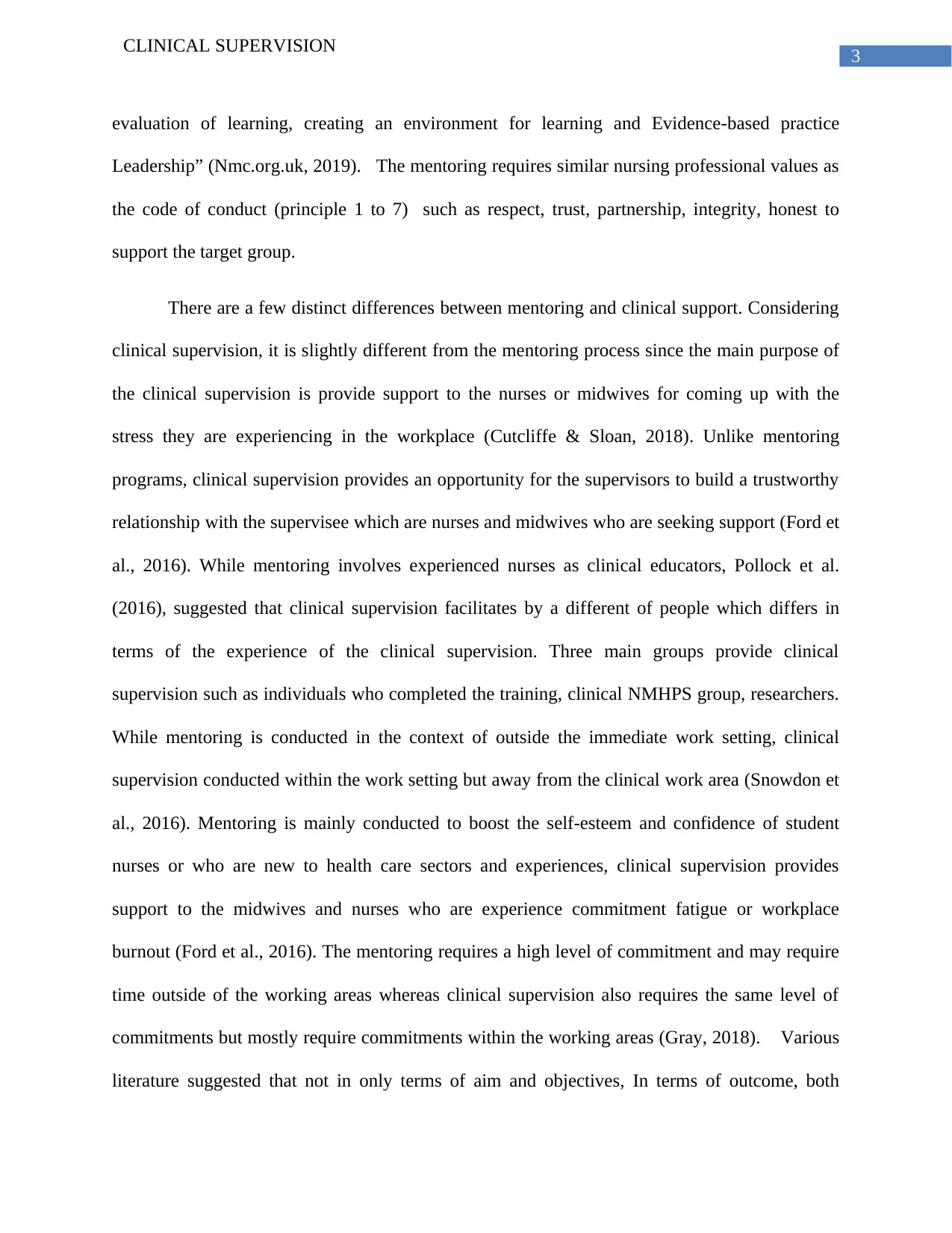
3
CLINICAL SUPERVISION
evaluation of learning, creating an environment for learning and Evidence-based practice
Leadership” (Nmc.org.uk, 2019). The mentoring requires similar nursing professional values as
the code of conduct (principle 1 to 7) such as respect, trust, partnership, integrity, honest to
support the target group.
There are a few distinct differences between mentoring and clinical support. Considering
clinical supervision, it is slightly different from the mentoring process since the main purpose of
the clinical supervision is provide support to the nurses or midwives for coming up with the
stress they are experiencing in the workplace (Cutcliffe & Sloan, 2018). Unlike mentoring
programs, clinical supervision provides an opportunity for the supervisors to build a trustworthy
relationship with the supervisee which are nurses and midwives who are seeking support (Ford et
al., 2016). While mentoring involves experienced nurses as clinical educators, Pollock et al.
(2016), suggested that clinical supervision facilitates by a different of people which differs in
terms of the experience of the clinical supervision. Three main groups provide clinical
supervision such as individuals who completed the training, clinical NMHPS group, researchers.
While mentoring is conducted in the context of outside the immediate work setting, clinical
supervision conducted within the work setting but away from the clinical work area (Snowdon et
al., 2016). Mentoring is mainly conducted to boost the self-esteem and confidence of student
nurses or who are new to health care sectors and experiences, clinical supervision provides
support to the midwives and nurses who are experience commitment fatigue or workplace
burnout (Ford et al., 2016). The mentoring requires a high level of commitment and may require
time outside of the working areas whereas clinical supervision also requires the same level of
commitments but mostly require commitments within the working areas (Gray, 2018). Various
literature suggested that not in only terms of aim and objectives, In terms of outcome, both
CLINICAL SUPERVISION
evaluation of learning, creating an environment for learning and Evidence-based practice
Leadership” (Nmc.org.uk, 2019). The mentoring requires similar nursing professional values as
the code of conduct (principle 1 to 7) such as respect, trust, partnership, integrity, honest to
support the target group.
There are a few distinct differences between mentoring and clinical support. Considering
clinical supervision, it is slightly different from the mentoring process since the main purpose of
the clinical supervision is provide support to the nurses or midwives for coming up with the
stress they are experiencing in the workplace (Cutcliffe & Sloan, 2018). Unlike mentoring
programs, clinical supervision provides an opportunity for the supervisors to build a trustworthy
relationship with the supervisee which are nurses and midwives who are seeking support (Ford et
al., 2016). While mentoring involves experienced nurses as clinical educators, Pollock et al.
(2016), suggested that clinical supervision facilitates by a different of people which differs in
terms of the experience of the clinical supervision. Three main groups provide clinical
supervision such as individuals who completed the training, clinical NMHPS group, researchers.
While mentoring is conducted in the context of outside the immediate work setting, clinical
supervision conducted within the work setting but away from the clinical work area (Snowdon et
al., 2016). Mentoring is mainly conducted to boost the self-esteem and confidence of student
nurses or who are new to health care sectors and experiences, clinical supervision provides
support to the midwives and nurses who are experience commitment fatigue or workplace
burnout (Ford et al., 2016). The mentoring requires a high level of commitment and may require
time outside of the working areas whereas clinical supervision also requires the same level of
commitments but mostly require commitments within the working areas (Gray, 2018). Various
literature suggested that not in only terms of aim and objectives, In terms of outcome, both
Paraphrase This Document
Need a fresh take? Get an instant paraphrase of this document with our AI Paraphraser
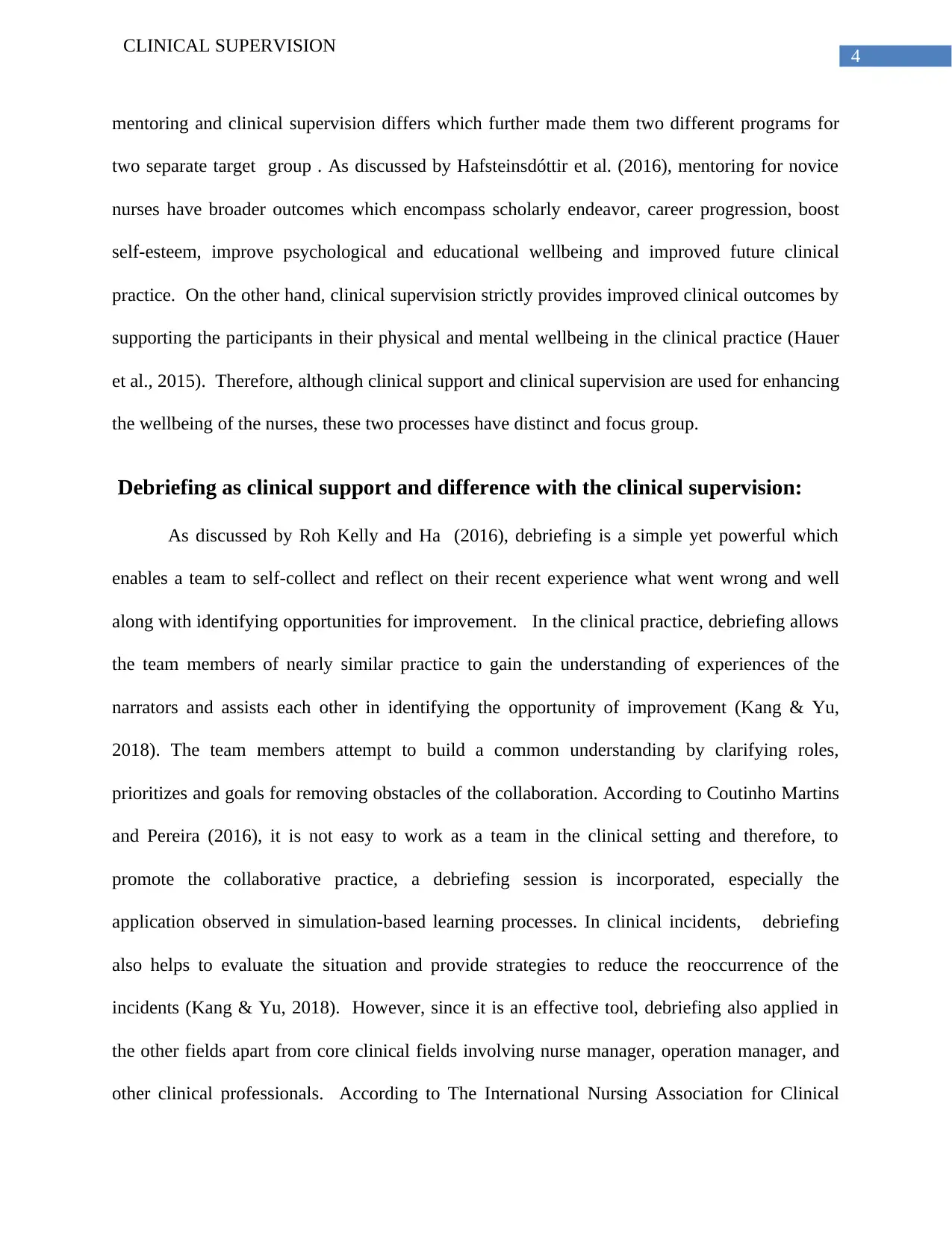
4
CLINICAL SUPERVISION
mentoring and clinical supervision differs which further made them two different programs for
two separate target group . As discussed by Hafsteinsdóttir et al. (2016), mentoring for novice
nurses have broader outcomes which encompass scholarly endeavor, career progression, boost
self-esteem, improve psychological and educational wellbeing and improved future clinical
practice. On the other hand, clinical supervision strictly provides improved clinical outcomes by
supporting the participants in their physical and mental wellbeing in the clinical practice (Hauer
et al., 2015). Therefore, although clinical support and clinical supervision are used for enhancing
the wellbeing of the nurses, these two processes have distinct and focus group.
Debriefing as clinical support and difference with the clinical supervision:
As discussed by Roh Kelly and Ha (2016), debriefing is a simple yet powerful which
enables a team to self-collect and reflect on their recent experience what went wrong and well
along with identifying opportunities for improvement. In the clinical practice, debriefing allows
the team members of nearly similar practice to gain the understanding of experiences of the
narrators and assists each other in identifying the opportunity of improvement (Kang & Yu,
2018). The team members attempt to build a common understanding by clarifying roles,
prioritizes and goals for removing obstacles of the collaboration. According to Coutinho Martins
and Pereira (2016), it is not easy to work as a team in the clinical setting and therefore, to
promote the collaborative practice, a debriefing session is incorporated, especially the
application observed in simulation-based learning processes. In clinical incidents, debriefing
also helps to evaluate the situation and provide strategies to reduce the reoccurrence of the
incidents (Kang & Yu, 2018). However, since it is an effective tool, debriefing also applied in
the other fields apart from core clinical fields involving nurse manager, operation manager, and
other clinical professionals. According to The International Nursing Association for Clinical
CLINICAL SUPERVISION
mentoring and clinical supervision differs which further made them two different programs for
two separate target group . As discussed by Hafsteinsdóttir et al. (2016), mentoring for novice
nurses have broader outcomes which encompass scholarly endeavor, career progression, boost
self-esteem, improve psychological and educational wellbeing and improved future clinical
practice. On the other hand, clinical supervision strictly provides improved clinical outcomes by
supporting the participants in their physical and mental wellbeing in the clinical practice (Hauer
et al., 2015). Therefore, although clinical support and clinical supervision are used for enhancing
the wellbeing of the nurses, these two processes have distinct and focus group.
Debriefing as clinical support and difference with the clinical supervision:
As discussed by Roh Kelly and Ha (2016), debriefing is a simple yet powerful which
enables a team to self-collect and reflect on their recent experience what went wrong and well
along with identifying opportunities for improvement. In the clinical practice, debriefing allows
the team members of nearly similar practice to gain the understanding of experiences of the
narrators and assists each other in identifying the opportunity of improvement (Kang & Yu,
2018). The team members attempt to build a common understanding by clarifying roles,
prioritizes and goals for removing obstacles of the collaboration. According to Coutinho Martins
and Pereira (2016), it is not easy to work as a team in the clinical setting and therefore, to
promote the collaborative practice, a debriefing session is incorporated, especially the
application observed in simulation-based learning processes. In clinical incidents, debriefing
also helps to evaluate the situation and provide strategies to reduce the reoccurrence of the
incidents (Kang & Yu, 2018). However, since it is an effective tool, debriefing also applied in
the other fields apart from core clinical fields involving nurse manager, operation manager, and
other clinical professionals. According to The International Nursing Association for Clinical
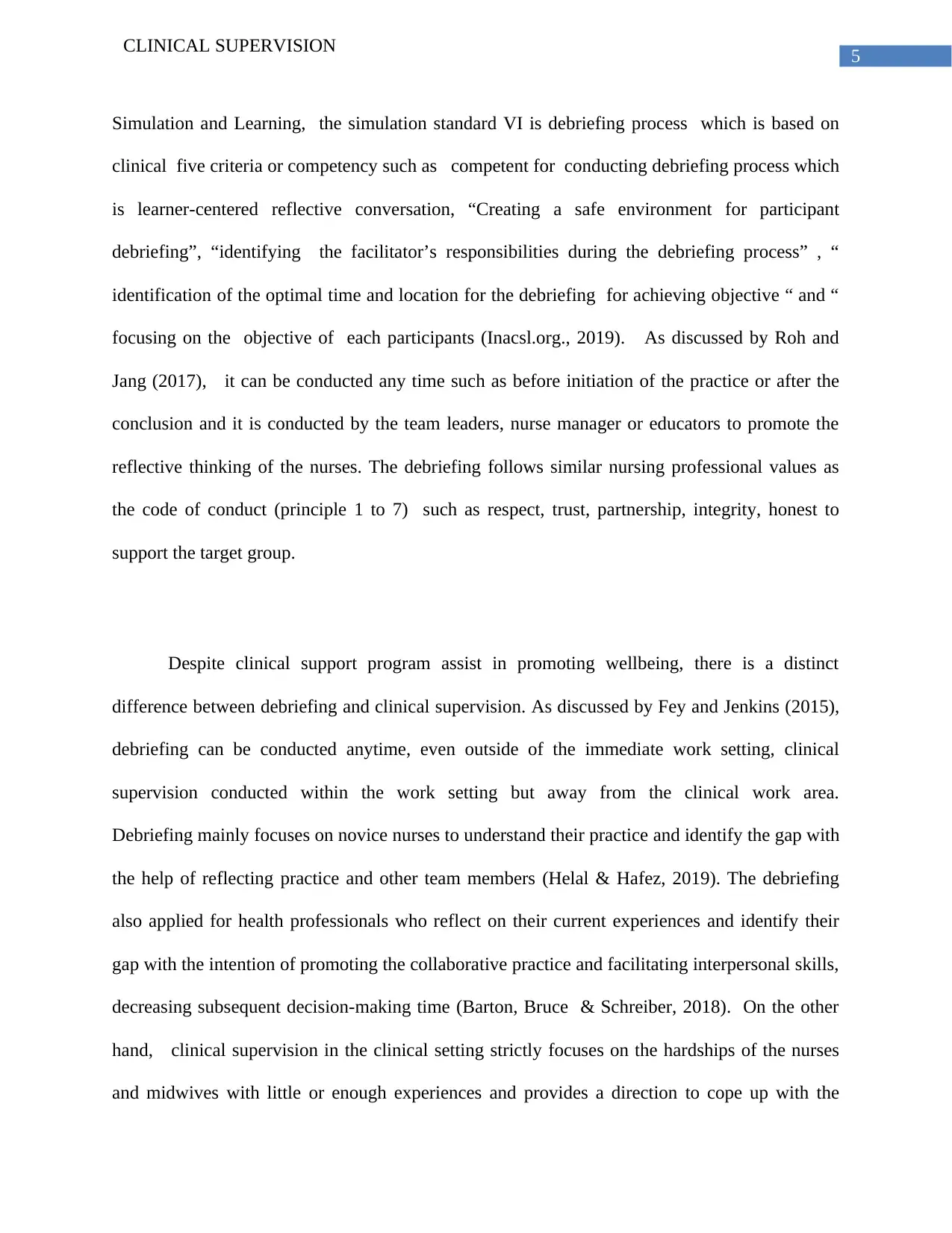
5
CLINICAL SUPERVISION
Simulation and Learning, the simulation standard VI is debriefing process which is based on
clinical five criteria or competency such as competent for conducting debriefing process which
is learner-centered reflective conversation, “Creating a safe environment for participant
debriefing”, “identifying the facilitator’s responsibilities during the debriefing process” , “
identification of the optimal time and location for the debriefing for achieving objective “ and “
focusing on the objective of each participants (Inacsl.org., 2019). As discussed by Roh and
Jang (2017), it can be conducted any time such as before initiation of the practice or after the
conclusion and it is conducted by the team leaders, nurse manager or educators to promote the
reflective thinking of the nurses. The debriefing follows similar nursing professional values as
the code of conduct (principle 1 to 7) such as respect, trust, partnership, integrity, honest to
support the target group.
Despite clinical support program assist in promoting wellbeing, there is a distinct
difference between debriefing and clinical supervision. As discussed by Fey and Jenkins (2015),
debriefing can be conducted anytime, even outside of the immediate work setting, clinical
supervision conducted within the work setting but away from the clinical work area.
Debriefing mainly focuses on novice nurses to understand their practice and identify the gap with
the help of reflecting practice and other team members (Helal & Hafez, 2019). The debriefing
also applied for health professionals who reflect on their current experiences and identify their
gap with the intention of promoting the collaborative practice and facilitating interpersonal skills,
decreasing subsequent decision-making time (Barton, Bruce & Schreiber, 2018). On the other
hand, clinical supervision in the clinical setting strictly focuses on the hardships of the nurses
and midwives with little or enough experiences and provides a direction to cope up with the
CLINICAL SUPERVISION
Simulation and Learning, the simulation standard VI is debriefing process which is based on
clinical five criteria or competency such as competent for conducting debriefing process which
is learner-centered reflective conversation, “Creating a safe environment for participant
debriefing”, “identifying the facilitator’s responsibilities during the debriefing process” , “
identification of the optimal time and location for the debriefing for achieving objective “ and “
focusing on the objective of each participants (Inacsl.org., 2019). As discussed by Roh and
Jang (2017), it can be conducted any time such as before initiation of the practice or after the
conclusion and it is conducted by the team leaders, nurse manager or educators to promote the
reflective thinking of the nurses. The debriefing follows similar nursing professional values as
the code of conduct (principle 1 to 7) such as respect, trust, partnership, integrity, honest to
support the target group.
Despite clinical support program assist in promoting wellbeing, there is a distinct
difference between debriefing and clinical supervision. As discussed by Fey and Jenkins (2015),
debriefing can be conducted anytime, even outside of the immediate work setting, clinical
supervision conducted within the work setting but away from the clinical work area.
Debriefing mainly focuses on novice nurses to understand their practice and identify the gap with
the help of reflecting practice and other team members (Helal & Hafez, 2019). The debriefing
also applied for health professionals who reflect on their current experiences and identify their
gap with the intention of promoting the collaborative practice and facilitating interpersonal skills,
decreasing subsequent decision-making time (Barton, Bruce & Schreiber, 2018). On the other
hand, clinical supervision in the clinical setting strictly focuses on the hardships of the nurses
and midwives with little or enough experiences and provides a direction to cope up with the
⊘ This is a preview!⊘
Do you want full access?
Subscribe today to unlock all pages.

Trusted by 1+ million students worldwide
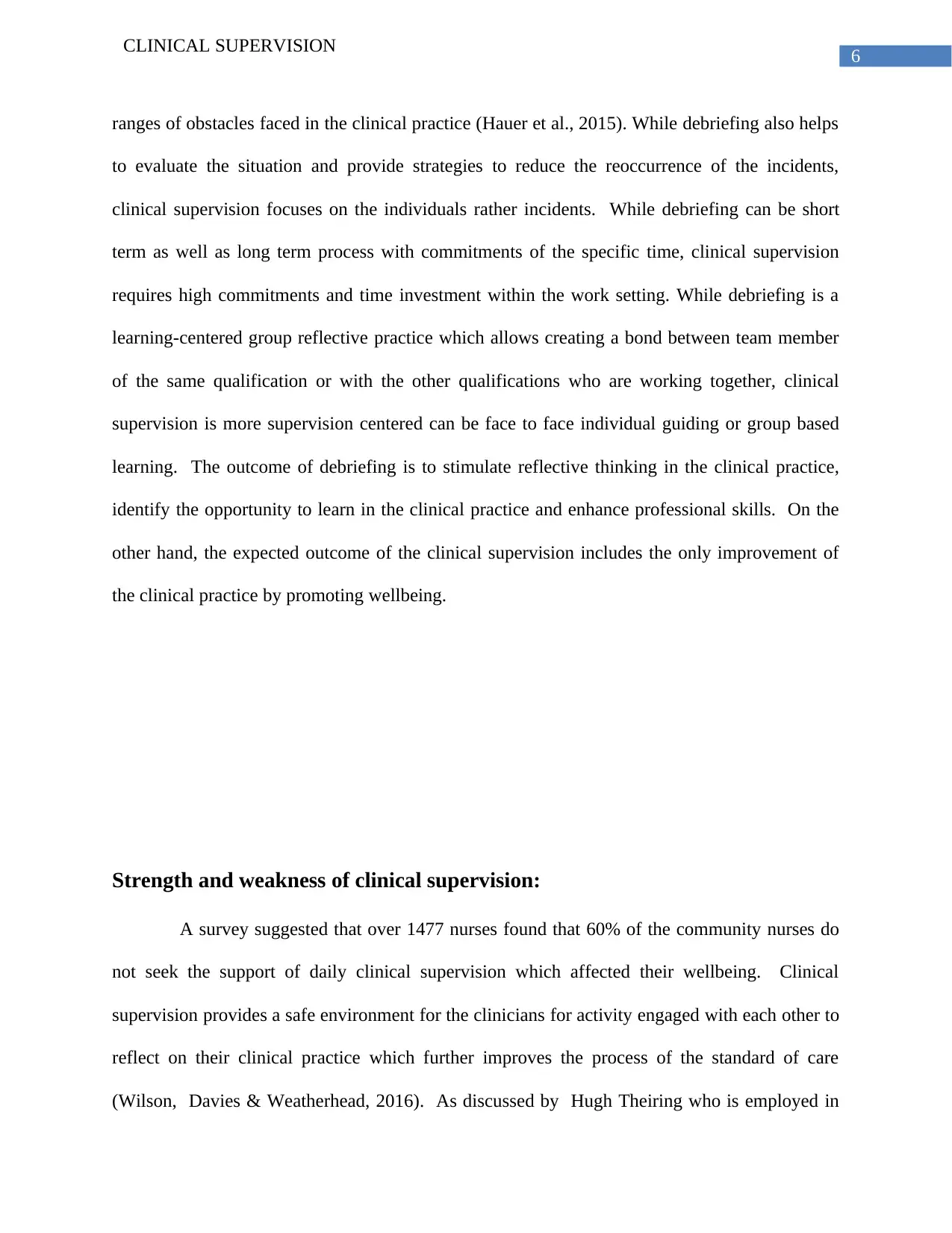
6
CLINICAL SUPERVISION
ranges of obstacles faced in the clinical practice (Hauer et al., 2015). While debriefing also helps
to evaluate the situation and provide strategies to reduce the reoccurrence of the incidents,
clinical supervision focuses on the individuals rather incidents. While debriefing can be short
term as well as long term process with commitments of the specific time, clinical supervision
requires high commitments and time investment within the work setting. While debriefing is a
learning-centered group reflective practice which allows creating a bond between team member
of the same qualification or with the other qualifications who are working together, clinical
supervision is more supervision centered can be face to face individual guiding or group based
learning. The outcome of debriefing is to stimulate reflective thinking in the clinical practice,
identify the opportunity to learn in the clinical practice and enhance professional skills. On the
other hand, the expected outcome of the clinical supervision includes the only improvement of
the clinical practice by promoting wellbeing.
Strength and weakness of clinical supervision:
A survey suggested that over 1477 nurses found that 60% of the community nurses do
not seek the support of daily clinical supervision which affected their wellbeing. Clinical
supervision provides a safe environment for the clinicians for activity engaged with each other to
reflect on their clinical practice which further improves the process of the standard of care
(Wilson, Davies & Weatherhead, 2016). As discussed by Hugh Theiring who is employed in
CLINICAL SUPERVISION
ranges of obstacles faced in the clinical practice (Hauer et al., 2015). While debriefing also helps
to evaluate the situation and provide strategies to reduce the reoccurrence of the incidents,
clinical supervision focuses on the individuals rather incidents. While debriefing can be short
term as well as long term process with commitments of the specific time, clinical supervision
requires high commitments and time investment within the work setting. While debriefing is a
learning-centered group reflective practice which allows creating a bond between team member
of the same qualification or with the other qualifications who are working together, clinical
supervision is more supervision centered can be face to face individual guiding or group based
learning. The outcome of debriefing is to stimulate reflective thinking in the clinical practice,
identify the opportunity to learn in the clinical practice and enhance professional skills. On the
other hand, the expected outcome of the clinical supervision includes the only improvement of
the clinical practice by promoting wellbeing.
Strength and weakness of clinical supervision:
A survey suggested that over 1477 nurses found that 60% of the community nurses do
not seek the support of daily clinical supervision which affected their wellbeing. Clinical
supervision provides a safe environment for the clinicians for activity engaged with each other to
reflect on their clinical practice which further improves the process of the standard of care
(Wilson, Davies & Weatherhead, 2016). As discussed by Hugh Theiring who is employed in
Paraphrase This Document
Need a fresh take? Get an instant paraphrase of this document with our AI Paraphraser
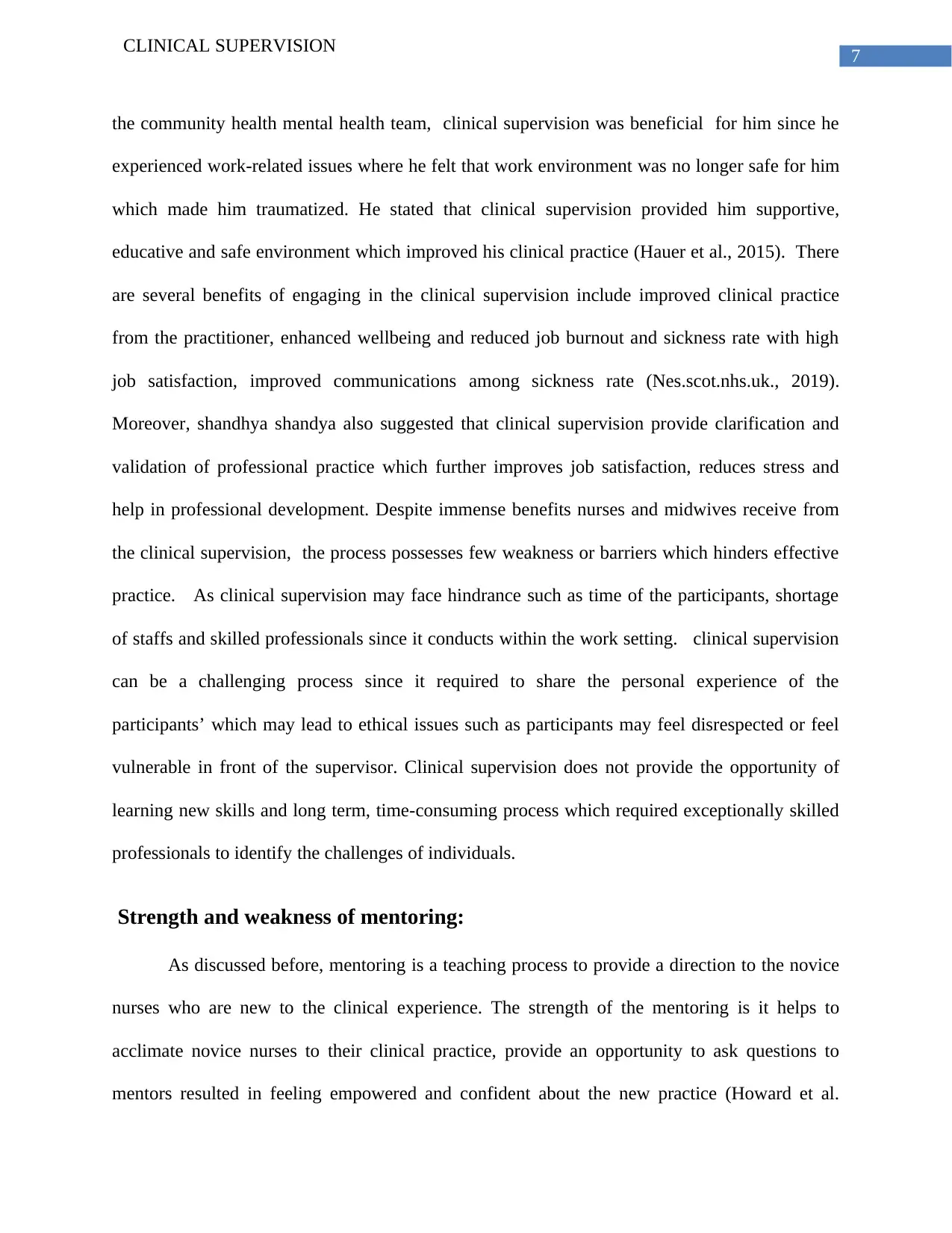
7
CLINICAL SUPERVISION
the community health mental health team, clinical supervision was beneficial for him since he
experienced work-related issues where he felt that work environment was no longer safe for him
which made him traumatized. He stated that clinical supervision provided him supportive,
educative and safe environment which improved his clinical practice (Hauer et al., 2015). There
are several benefits of engaging in the clinical supervision include improved clinical practice
from the practitioner, enhanced wellbeing and reduced job burnout and sickness rate with high
job satisfaction, improved communications among sickness rate (Nes.scot.nhs.uk., 2019).
Moreover, shandhya shandya also suggested that clinical supervision provide clarification and
validation of professional practice which further improves job satisfaction, reduces stress and
help in professional development. Despite immense benefits nurses and midwives receive from
the clinical supervision, the process possesses few weakness or barriers which hinders effective
practice. As clinical supervision may face hindrance such as time of the participants, shortage
of staffs and skilled professionals since it conducts within the work setting. clinical supervision
can be a challenging process since it required to share the personal experience of the
participants’ which may lead to ethical issues such as participants may feel disrespected or feel
vulnerable in front of the supervisor. Clinical supervision does not provide the opportunity of
learning new skills and long term, time-consuming process which required exceptionally skilled
professionals to identify the challenges of individuals.
Strength and weakness of mentoring:
As discussed before, mentoring is a teaching process to provide a direction to the novice
nurses who are new to the clinical experience. The strength of the mentoring is it helps to
acclimate novice nurses to their clinical practice, provide an opportunity to ask questions to
mentors resulted in feeling empowered and confident about the new practice (Howard et al.
CLINICAL SUPERVISION
the community health mental health team, clinical supervision was beneficial for him since he
experienced work-related issues where he felt that work environment was no longer safe for him
which made him traumatized. He stated that clinical supervision provided him supportive,
educative and safe environment which improved his clinical practice (Hauer et al., 2015). There
are several benefits of engaging in the clinical supervision include improved clinical practice
from the practitioner, enhanced wellbeing and reduced job burnout and sickness rate with high
job satisfaction, improved communications among sickness rate (Nes.scot.nhs.uk., 2019).
Moreover, shandhya shandya also suggested that clinical supervision provide clarification and
validation of professional practice which further improves job satisfaction, reduces stress and
help in professional development. Despite immense benefits nurses and midwives receive from
the clinical supervision, the process possesses few weakness or barriers which hinders effective
practice. As clinical supervision may face hindrance such as time of the participants, shortage
of staffs and skilled professionals since it conducts within the work setting. clinical supervision
can be a challenging process since it required to share the personal experience of the
participants’ which may lead to ethical issues such as participants may feel disrespected or feel
vulnerable in front of the supervisor. Clinical supervision does not provide the opportunity of
learning new skills and long term, time-consuming process which required exceptionally skilled
professionals to identify the challenges of individuals.
Strength and weakness of mentoring:
As discussed before, mentoring is a teaching process to provide a direction to the novice
nurses who are new to the clinical experience. The strength of the mentoring is it helps to
acclimate novice nurses to their clinical practice, provide an opportunity to ask questions to
mentors resulted in feeling empowered and confident about the new practice (Howard et al.
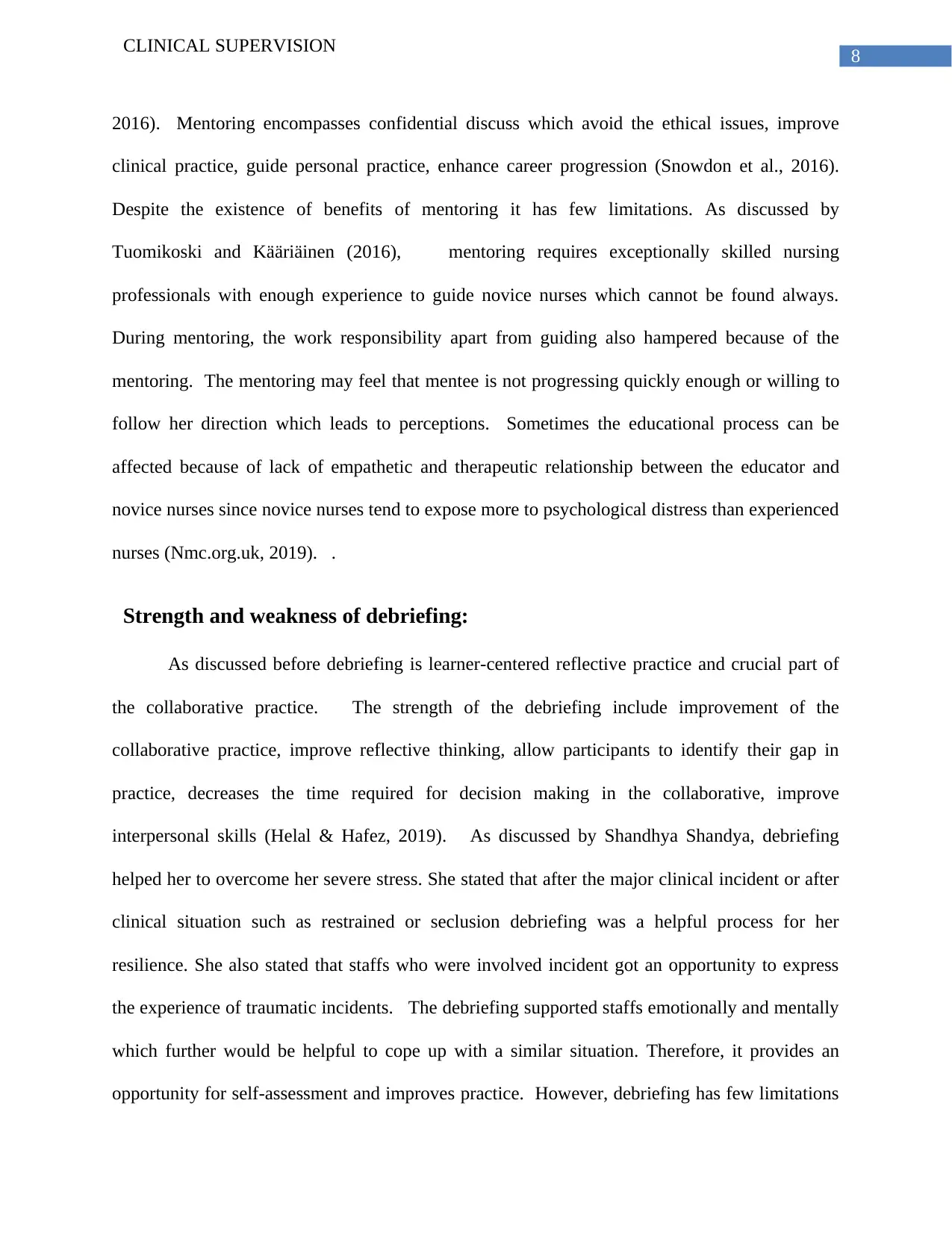
8
CLINICAL SUPERVISION
2016). Mentoring encompasses confidential discuss which avoid the ethical issues, improve
clinical practice, guide personal practice, enhance career progression (Snowdon et al., 2016).
Despite the existence of benefits of mentoring it has few limitations. As discussed by
Tuomikoski and Kääriäinen (2016), mentoring requires exceptionally skilled nursing
professionals with enough experience to guide novice nurses which cannot be found always.
During mentoring, the work responsibility apart from guiding also hampered because of the
mentoring. The mentoring may feel that mentee is not progressing quickly enough or willing to
follow her direction which leads to perceptions. Sometimes the educational process can be
affected because of lack of empathetic and therapeutic relationship between the educator and
novice nurses since novice nurses tend to expose more to psychological distress than experienced
nurses (Nmc.org.uk, 2019). .
Strength and weakness of debriefing:
As discussed before debriefing is learner-centered reflective practice and crucial part of
the collaborative practice. The strength of the debriefing include improvement of the
collaborative practice, improve reflective thinking, allow participants to identify their gap in
practice, decreases the time required for decision making in the collaborative, improve
interpersonal skills (Helal & Hafez, 2019). As discussed by Shandhya Shandya, debriefing
helped her to overcome her severe stress. She stated that after the major clinical incident or after
clinical situation such as restrained or seclusion debriefing was a helpful process for her
resilience. She also stated that staffs who were involved incident got an opportunity to express
the experience of traumatic incidents. The debriefing supported staffs emotionally and mentally
which further would be helpful to cope up with a similar situation. Therefore, it provides an
opportunity for self-assessment and improves practice. However, debriefing has few limitations
CLINICAL SUPERVISION
2016). Mentoring encompasses confidential discuss which avoid the ethical issues, improve
clinical practice, guide personal practice, enhance career progression (Snowdon et al., 2016).
Despite the existence of benefits of mentoring it has few limitations. As discussed by
Tuomikoski and Kääriäinen (2016), mentoring requires exceptionally skilled nursing
professionals with enough experience to guide novice nurses which cannot be found always.
During mentoring, the work responsibility apart from guiding also hampered because of the
mentoring. The mentoring may feel that mentee is not progressing quickly enough or willing to
follow her direction which leads to perceptions. Sometimes the educational process can be
affected because of lack of empathetic and therapeutic relationship between the educator and
novice nurses since novice nurses tend to expose more to psychological distress than experienced
nurses (Nmc.org.uk, 2019). .
Strength and weakness of debriefing:
As discussed before debriefing is learner-centered reflective practice and crucial part of
the collaborative practice. The strength of the debriefing include improvement of the
collaborative practice, improve reflective thinking, allow participants to identify their gap in
practice, decreases the time required for decision making in the collaborative, improve
interpersonal skills (Helal & Hafez, 2019). As discussed by Shandhya Shandya, debriefing
helped her to overcome her severe stress. She stated that after the major clinical incident or after
clinical situation such as restrained or seclusion debriefing was a helpful process for her
resilience. She also stated that staffs who were involved incident got an opportunity to express
the experience of traumatic incidents. The debriefing supported staffs emotionally and mentally
which further would be helpful to cope up with a similar situation. Therefore, it provides an
opportunity for self-assessment and improves practice. However, debriefing has few limitations
⊘ This is a preview!⊘
Do you want full access?
Subscribe today to unlock all pages.

Trusted by 1+ million students worldwide
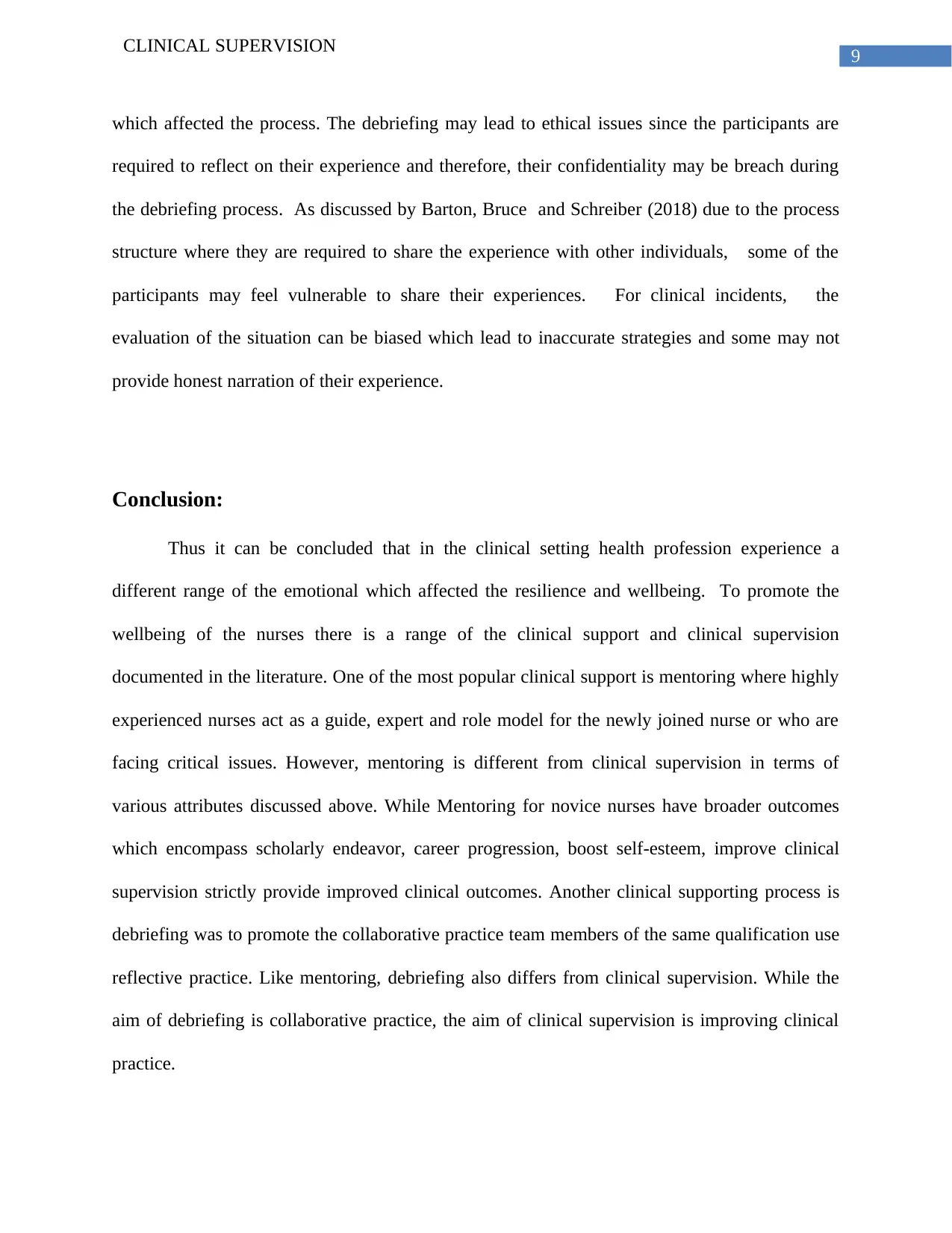
9
CLINICAL SUPERVISION
which affected the process. The debriefing may lead to ethical issues since the participants are
required to reflect on their experience and therefore, their confidentiality may be breach during
the debriefing process. As discussed by Barton, Bruce and Schreiber (2018) due to the process
structure where they are required to share the experience with other individuals, some of the
participants may feel vulnerable to share their experiences. For clinical incidents, the
evaluation of the situation can be biased which lead to inaccurate strategies and some may not
provide honest narration of their experience.
Conclusion:
Thus it can be concluded that in the clinical setting health profession experience a
different range of the emotional which affected the resilience and wellbeing. To promote the
wellbeing of the nurses there is a range of the clinical support and clinical supervision
documented in the literature. One of the most popular clinical support is mentoring where highly
experienced nurses act as a guide, expert and role model for the newly joined nurse or who are
facing critical issues. However, mentoring is different from clinical supervision in terms of
various attributes discussed above. While Mentoring for novice nurses have broader outcomes
which encompass scholarly endeavor, career progression, boost self-esteem, improve clinical
supervision strictly provide improved clinical outcomes. Another clinical supporting process is
debriefing was to promote the collaborative practice team members of the same qualification use
reflective practice. Like mentoring, debriefing also differs from clinical supervision. While the
aim of debriefing is collaborative practice, the aim of clinical supervision is improving clinical
practice.
CLINICAL SUPERVISION
which affected the process. The debriefing may lead to ethical issues since the participants are
required to reflect on their experience and therefore, their confidentiality may be breach during
the debriefing process. As discussed by Barton, Bruce and Schreiber (2018) due to the process
structure where they are required to share the experience with other individuals, some of the
participants may feel vulnerable to share their experiences. For clinical incidents, the
evaluation of the situation can be biased which lead to inaccurate strategies and some may not
provide honest narration of their experience.
Conclusion:
Thus it can be concluded that in the clinical setting health profession experience a
different range of the emotional which affected the resilience and wellbeing. To promote the
wellbeing of the nurses there is a range of the clinical support and clinical supervision
documented in the literature. One of the most popular clinical support is mentoring where highly
experienced nurses act as a guide, expert and role model for the newly joined nurse or who are
facing critical issues. However, mentoring is different from clinical supervision in terms of
various attributes discussed above. While Mentoring for novice nurses have broader outcomes
which encompass scholarly endeavor, career progression, boost self-esteem, improve clinical
supervision strictly provide improved clinical outcomes. Another clinical supporting process is
debriefing was to promote the collaborative practice team members of the same qualification use
reflective practice. Like mentoring, debriefing also differs from clinical supervision. While the
aim of debriefing is collaborative practice, the aim of clinical supervision is improving clinical
practice.
Paraphrase This Document
Need a fresh take? Get an instant paraphrase of this document with our AI Paraphraser

10
CLINICAL SUPERVISION
CLINICAL SUPERVISION
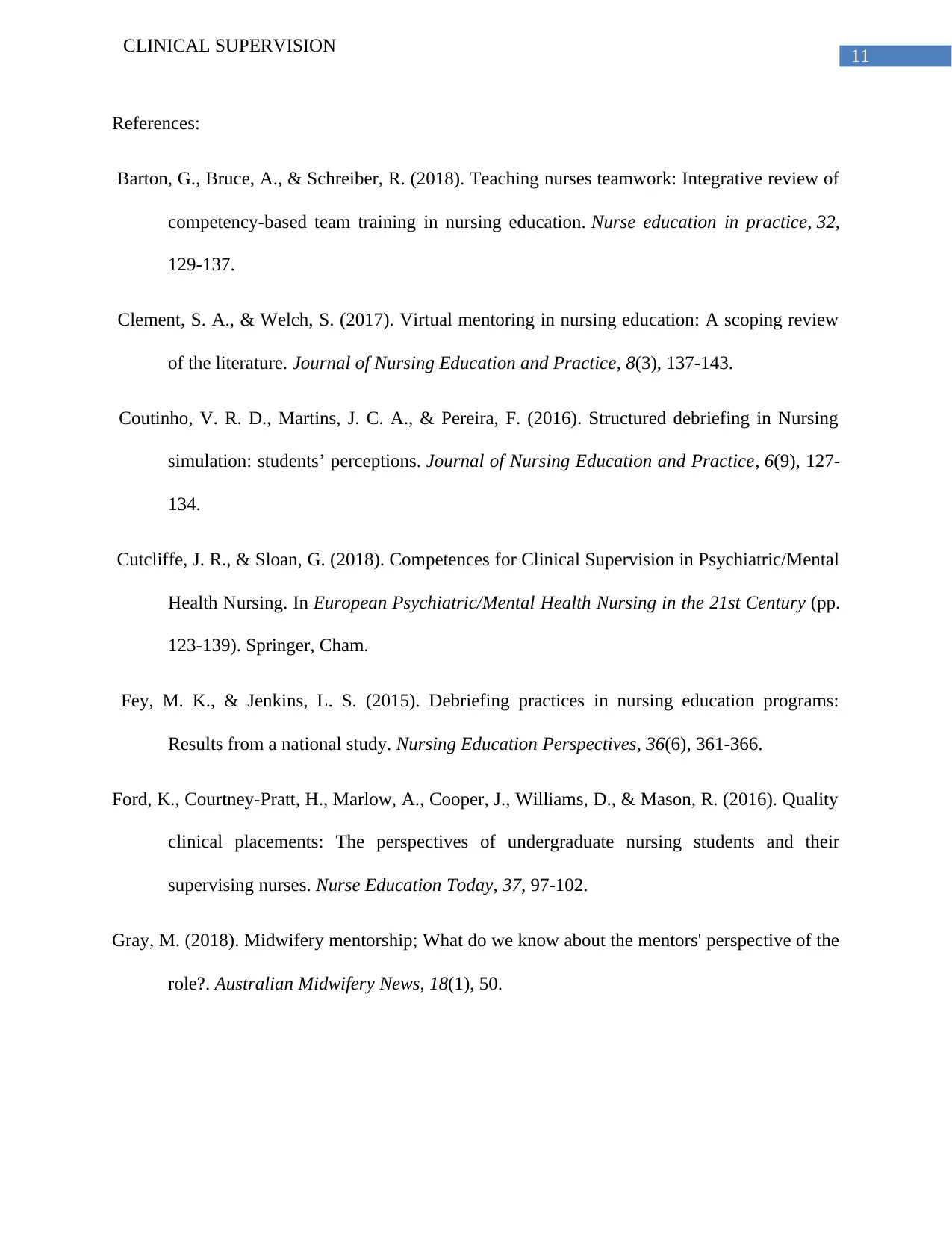
11
CLINICAL SUPERVISION
References:
Barton, G., Bruce, A., & Schreiber, R. (2018). Teaching nurses teamwork: Integrative review of
competency-based team training in nursing education. Nurse education in practice, 32,
129-137.
Clement, S. A., & Welch, S. (2017). Virtual mentoring in nursing education: A scoping review
of the literature. Journal of Nursing Education and Practice, 8(3), 137-143.
Coutinho, V. R. D., Martins, J. C. A., & Pereira, F. (2016). Structured debriefing in Nursing
simulation: students’ perceptions. Journal of Nursing Education and Practice, 6(9), 127-
134.
Cutcliffe, J. R., & Sloan, G. (2018). Competences for Clinical Supervision in Psychiatric/Mental
Health Nursing. In European Psychiatric/Mental Health Nursing in the 21st Century (pp.
123-139). Springer, Cham.
Fey, M. K., & Jenkins, L. S. (2015). Debriefing practices in nursing education programs:
Results from a national study. Nursing Education Perspectives, 36(6), 361-366.
Ford, K., Courtney-Pratt, H., Marlow, A., Cooper, J., Williams, D., & Mason, R. (2016). Quality
clinical placements: The perspectives of undergraduate nursing students and their
supervising nurses. Nurse Education Today, 37, 97-102.
Gray, M. (2018). Midwifery mentorship; What do we know about the mentors' perspective of the
role?. Australian Midwifery News, 18(1), 50.
CLINICAL SUPERVISION
References:
Barton, G., Bruce, A., & Schreiber, R. (2018). Teaching nurses teamwork: Integrative review of
competency-based team training in nursing education. Nurse education in practice, 32,
129-137.
Clement, S. A., & Welch, S. (2017). Virtual mentoring in nursing education: A scoping review
of the literature. Journal of Nursing Education and Practice, 8(3), 137-143.
Coutinho, V. R. D., Martins, J. C. A., & Pereira, F. (2016). Structured debriefing in Nursing
simulation: students’ perceptions. Journal of Nursing Education and Practice, 6(9), 127-
134.
Cutcliffe, J. R., & Sloan, G. (2018). Competences for Clinical Supervision in Psychiatric/Mental
Health Nursing. In European Psychiatric/Mental Health Nursing in the 21st Century (pp.
123-139). Springer, Cham.
Fey, M. K., & Jenkins, L. S. (2015). Debriefing practices in nursing education programs:
Results from a national study. Nursing Education Perspectives, 36(6), 361-366.
Ford, K., Courtney-Pratt, H., Marlow, A., Cooper, J., Williams, D., & Mason, R. (2016). Quality
clinical placements: The perspectives of undergraduate nursing students and their
supervising nurses. Nurse Education Today, 37, 97-102.
Gray, M. (2018). Midwifery mentorship; What do we know about the mentors' perspective of the
role?. Australian Midwifery News, 18(1), 50.
⊘ This is a preview!⊘
Do you want full access?
Subscribe today to unlock all pages.

Trusted by 1+ million students worldwide
1 out of 15
Related Documents
Your All-in-One AI-Powered Toolkit for Academic Success.
+13062052269
info@desklib.com
Available 24*7 on WhatsApp / Email
![[object Object]](/_next/static/media/star-bottom.7253800d.svg)
Unlock your academic potential
Copyright © 2020–2026 A2Z Services. All Rights Reserved. Developed and managed by ZUCOL.

![Clinical Mentoring Plan for Mental Health Nursing - [University Name]](/_next/image/?url=https%3A%2F%2Fdesklib.com%2Fmedia%2Fclinical-mentoring-plan-mental-health-nurses_page_2.jpg&w=256&q=75)



